Does your dinner come from a 'dark kitchen'?
Your next meal might come from this windswept industrial estate on the banks of the River Irwell.
Outside, a handful of drivers wait in their cars. Mopeds and bicycles are stacked in a small pile. All are poised to collect freshly prepared, restaurant quality meals and take them to hungry consumers at home.
But this is not a restaurant. It's a so-called "dark kitchen". Deliveroo Editions are a cluster of small professional workspaces that allow established eateries to service our insatiable appetite for app delivery without over-stretching existing sites.
"The whole idea is to help restaurants expand into new areas without necessarily having the same cost-base they would have in expanding on the high street," explains Dan Warne, managing director of Deliveroo UK.
"In 90% of cases, your dinner is going to come from a high street restaurant. And it will be very clear."
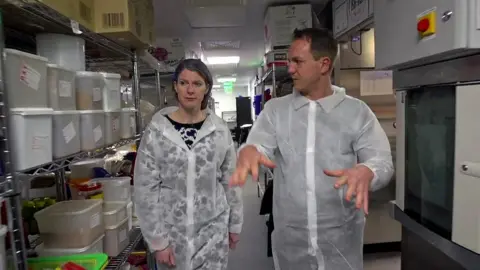
Customers can spot if their meal comes from these sites via a purple Editions logo online. There are now 16 sites across England housing about a hundred stainless-steel kitchens. Some have pizza ovens, others fast-flip burgers.
The different restaurant brands have their own staff and cookers, but they share shelves and facilities. Like a student house, the fridge is littered with Post-Its on ingredients. But most crucially, it's Deliveroo paying the bills; no rent, no rates, no utilities.
All restaurants chip in is commission on each order, but it's unclear how much. Deliveroo would not give the BBC a figure, explaining it varies from business to business. But Mr Warne dismisses claims that the kitchens take business away from High Streets and gives more power to the app.
"We've helped the industry over the last five years by bringing a dine-in experience to a customer at home. Incrementally that's adding 30% on top of the sales that these restaurants are already achieving."
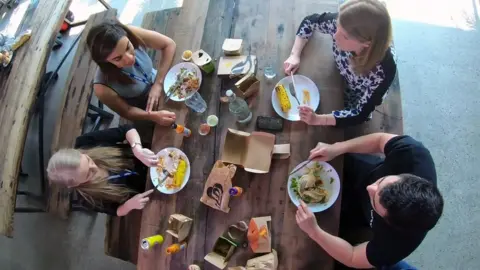
Apps now account for 39% of delivery visits - a rise of 14% year-on-year - and the takeaway industry has grown and grown to be worth a tasty £4.9bn - according to consumer research firm NPD.
Dark kitchens make huge sense for the burger brand Boo. Set up by Arif Palejwala and his brother-in-law in Leicester, they have reached three other cities without having to find premises or fork out.
"We're basically testing the waters. We started off in Nottingham and performed really well," he explains.
"Then they offered us a Manchester site, we're going to be going to Leeds and probably some of the places down south as well. So hopefully in the next 12 months we'll have six to eight kitchens."
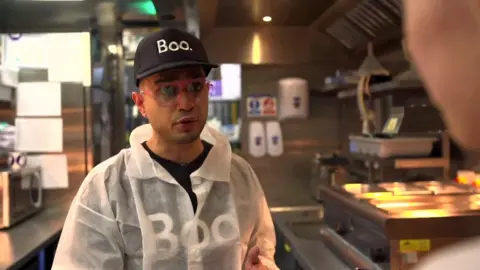
Likewise, luxury sushi business Zumu is using the space to reach a city-centre delivery market.
"We are new," says co-owner Oliver Ibanez. "We can cater for people here in the centre of Manchester without buying equipment or renting; we just come here and do our cooking."
The company is also trialling a spin-off Filipino chicken brand to their new click-ready clientele; and it's flying.
But others are not convinced.
In Manchester city centre, vegetarian street-food joint Bundobust is buzzing - and poised to open a third site of its stunning, retro-style Indian restaurants in Liverpool in just a few weeks.
The brand is thriving. Without any apps.
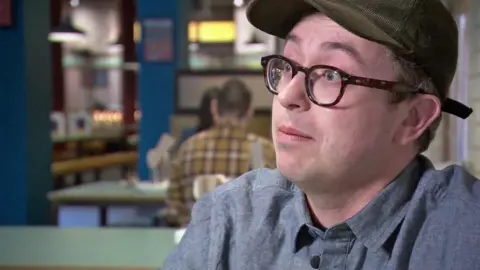
"When the customer eats our food, I want it to be as perfect as it can be," says co-founder Marko Husak.
"If it goes on a moped for fifteen minutes, it might be cold, it might be soggy, it might have spilled. It's always better to go to a restaurant than have it delivered to your door."
Mr Husak does not view the apps as a threat, but does want consumers to value the dining in experience.
There is also growing disquiet about planning and regulation of the Editions sites.
Of the 16 locations, three have been served with enforcement notices by the local council that are currently going through an appeal process.
Two more have only been granted temporary permission to operate. A former site in Camberwell was served notice to cease operating.
The first wave of kitchens began in 2017 in London from portable buildings. Newer sites outside the capital are in permanent constructions. But none are registered as a restaurant or takeaway, avoiding complex planning permissions. All kitchens are subject to Food Standards Agency checks.

Deliveroo Editions locations
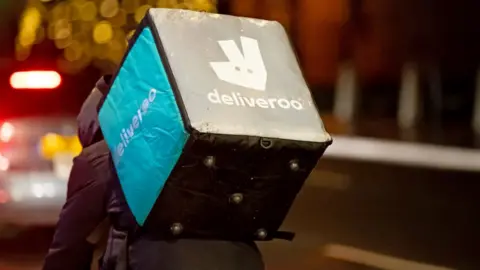 Getty Images
Getty Images- London: Battersea (York Road, Queens Road & Culvert Place), Bermondsey, Blackwall, Dulwich, Hornsey, Islington, Swiss Cottage, Whitechapel
- Cambridge
- Hove
- Nottingham
- Leeds
- Reading
- Salford

The company is operating in a new grey area. And the Editions model is still a small part of Deliveroo's business - only a hundred kitchens versus about 20,000 partner restaurants - but the tech firm is investing heavily and expanding.
"It's a way that the industry can help itself evolve and move into the future," says Mr Warne.
With over 1,200 restaurant insolvencies hitting big-name chains and independents in 2018, there is no denying there's a shake-up in how we want to get our food. And Deliveroo is determined to a take a big bite of that.
